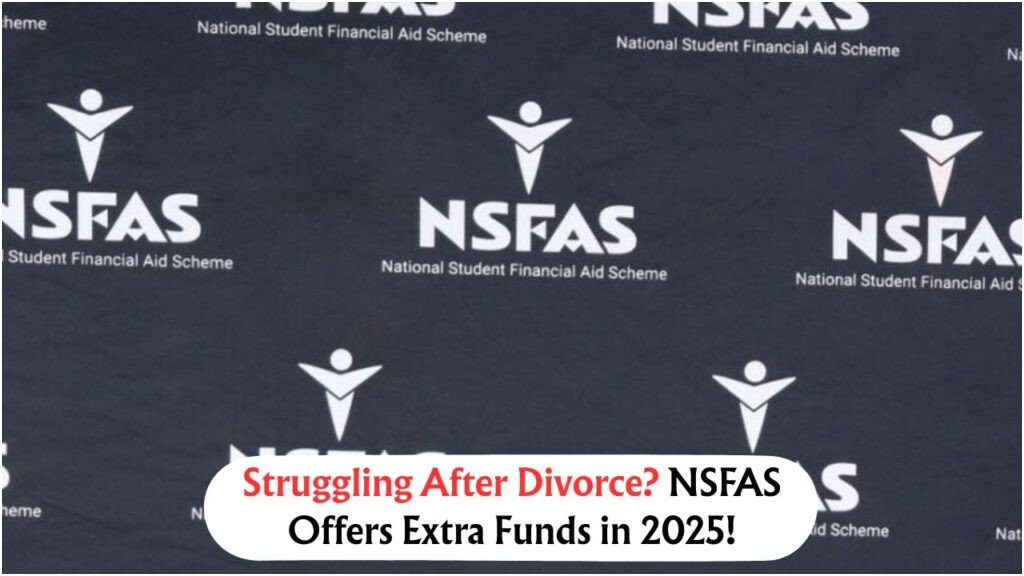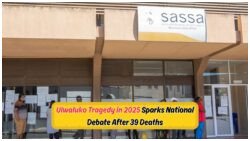August 2025 Breakthrough: NSFAS Launches Divorce Law Aid, offering a beacon of hope for students grappling with the challenges of separation. This initiative is a lifeline for those whose educational pursuits have been disrupted by family upheavals. As a first of its kind in South Africa, the National Student Financial Aid Scheme (NSFAS) is addressing a critical gap, ensuring that students affected by divorce can continue their studies without undue financial burden. This pioneering program not only supports education but also promotes resilience and stability among young South Africans facing personal challenges.
Understanding the NSFAS Divorce Law Aid Initiative
The newly launched Divorce Law Aid by NSFAS is a groundbreaking step in the realm of student support. This initiative is designed to provide financial assistance for students who have been affected by their parents’ separation or divorce, which often leads to financial instability and emotional distress. By addressing these issues head-on, NSFAS aims to ensure that no student has to abandon their education due to familial disruptions. The program is structured to assess the needs of each applicant thoroughly, considering their specific circumstances and the impact of their family situation on their educational prospects.
- Eligibility is determined based on financial need stemming from divorce.
- Documentation required includes proof of divorce and financial statements.
- Assistance covers tuition fees, accommodation, and study materials.
- Applications are reviewed on a case-by-case basis to ensure fairness.
- Support is extended throughout the duration of study, contingent on academic performance.
Eligibility Criteria for Separated Students
To qualify for the NSFAS Divorce Law Aid, students must meet specific criteria that reflect the program’s intent to assist those genuinely in need. Eligibility is primarily determined by the financial impact of the divorce on the student’s household and their ability to fund their education. Applicants must provide comprehensive documentation, which includes legal papers confirming the divorce, current financial statements of the custodial parent, and a detailed account of how the divorce has financially affected their education. These measures ensure that the aid reaches those who need it most, allowing them to focus on their studies without the added stress of financial uncertainty.
- Applicants must be enrolled in a recognized South African tertiary institution.
- Proof of financial need must be demonstrated through detailed documentation.
- Applicants should show consistent academic performance to maintain aid.
- Regular updates on personal and financial situations are required.
- Priority is given to those in their first year of study, addressing the transition period post-divorce.
- Applications are open throughout the academic year with no strict deadlines.
- NSFAS provides resources to assist with application processes.
- Confidentiality of applicants’ personal information is strictly maintained.
Impact of Divorce Law Aid on Education
The introduction of the Divorce Law Aid by NSFAS has the potential to significantly impact the educational landscape for separated students in South Africa. By mitigating the financial burden caused by divorce, this initiative enables students to pursue higher education with fewer obstacles. The program not only supports the individual students but also contributes to the broader goal of improving educational access and success rates in the country. With the financial strain eased, students can dedicate more time and energy to their academic pursuits, ultimately leading to better educational outcomes and career opportunities.
| Benefit | Expected Outcome |
|---|---|
| Financial Relief | Reduced drop-out rates |
| Focus on Studies | Improved academic performance |
| Emotional Support | Better mental health and resilience |
| Access to Resources | Increased educational opportunities |
| Long-term Success | Enhanced career prospects |
| Community Support | Stronger social networks |
| Policy Influence | Increased government support for similar initiatives |
| Public Awareness | Greater understanding of educational challenges post-divorce |
Challenges and Future Prospects of NSFAS Aid
While the Divorce Law Aid initiative by NSFAS is a positive step, there are challenges that need to be addressed to ensure its success. One significant challenge is ensuring that all eligible students are aware of this opportunity and know how to apply. Additionally, the program must be adequately funded to meet the demand, which may increase as awareness grows. There is also a need to continuously monitor and evaluate the effectiveness of the aid to make necessary adjustments. Looking to the future, NSFAS aims to expand this initiative, potentially including additional support services such as counseling and mentorship to further assist students navigating the complexities of divorce.
- Increasing awareness through university outreach programs.
- Ensuring sustainable funding and government support.
- Continuous evaluation and feedback loops for program improvement.
- Potential expansion to include psychological support services.
- Collaboration with NGOs and community groups for broader reach.
- Streamlining application processes to reduce administrative burden.
Frequently Asked Questions about NSFAS Divorce Law Aid
Here are some common questions regarding the Divorce Law Aid initiative:
| Question | Answer | Details |
|---|---|---|
| Who can apply? | Students affected by divorce. | Must meet financial need criteria. |
| What does the aid cover? | Tuition, accommodation, materials. | Varies based on individual needs. |
| Is ongoing support available? | Yes, contingent on performance. | Reviewed annually. |
| How to apply? | Through NSFAS portal. | Instructions provided online. |
| What is the application deadline? | No strict deadline. | Open throughout the year. |
Exploring the Social Impacts of NSFAS Divorce Aid
The social implications of the NSFAS Divorce Law Aid extend beyond the immediate educational benefits. By supporting students through such challenging times, NSFAS is fostering a more equitable society where educational opportunities are not solely determined by one’s family circumstances. This initiative promotes social mobility, allowing students from disrupted families to break the cycle of poverty and achieve their full potential. Additionally, it sets a precedent for other student aid programs to consider the broader social factors affecting educational access and success, encouraging a more holistic approach to student support across the nation.
- Promotes social equity and inclusion.
- Encourages policy development in student aid.
- Increases public awareness of educational barriers.
- Strengthens community support networks.
- Enhances long-term societal outcomes through education.
Application Process for Divorce Law Aid
Applying for the NSFAS Divorce Law Aid:
Students interested in applying for the Divorce Law Aid should begin by visiting the NSFAS official website, where detailed instructions and application forms are available. It is crucial to gather all necessary documentation, including proof of divorce and financial records, to ensure a smooth application process. Applicants are encouraged to apply early and seek assistance from their university’s financial aid office if needed. NSFAS also provides online resources and helplines to assist applicants in navigating the process. Successful applicants will be notified via email and provided with details on the disbursement of funds and ongoing support conditions.
Ensuring a Smooth Application Experience:
To facilitate a smooth application experience, it is recommended that students prepare all required documents in advance and carefully follow the guidelines provided on the NSFAS website. Maintaining accurate records and communication with NSFAS representatives can help resolve any issues that may arise during the application process. Students are also advised to regularly check their email and NSFAS portal for updates on their application status and any additional information or actions required.
Maintaining Aid and Support:
Once aid is granted, it is essential for students to maintain the academic performance standards set by NSFAS to ensure continued support. Regular updates on any changes in financial or personal circumstances must be communicated to NSFAS to maintain transparency and eligibility. By adhering to these guidelines, students can maximize the benefits of the Divorce Law Aid program, allowing them to focus on their academic journey with peace of mind.
Looking Ahead:
As the NSFAS Divorce Law Aid initiative continues to develop, there is hope that it will inspire similar programs and foster a more inclusive educational environment across South Africa. By addressing the unique challenges faced by students affected by divorce, NSFAS not only supports individual educational success but also contributes to the broader societal goal of equal opportunity for all students, regardless of their family background.
Final Thoughts:
NSFAS’s introduction of the Divorce Law Aid is a significant step toward supporting vulnerable students in South Africa, providing them with the resources they need to succeed academically and personally. This initiative is poised to make a lasting impact on the educational landscape, promoting resilience and opportunity in the face of adversity.





